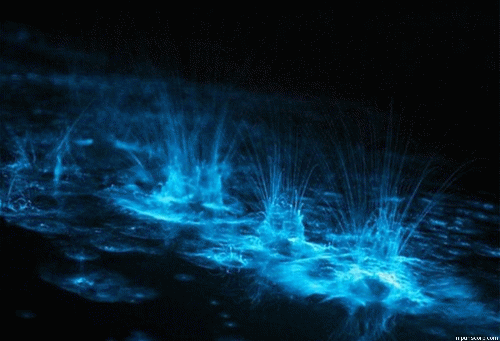We have been fortunate enough to see this natural wonder ourselves in Mosquito Bay on the little island of Vieques off the coast of Puerto Rico. To watch the liquid sparkle spill off your hand as you dip it into the dark water, or see the illuminated blue outline of a tropical fish draw a comet-like trail across the midnight bay is a once-in-a lifetime experience. There are few spots on earth where Red Mangrove roots meet saltwater in a protective, pollution-free lagoon to create the necessary conditions for these fragile little creatures to survive.
As with so many unspoiled ecosystems, the world's largest, most perfect biobay in danger. As is Vieques, itself. And on Earth Day it is worth noting how our military maneuvers almost destroyed the island, and continues to threaten the population with abandoned by-products from our weapons of war.

May 1st, 2013 will mark the 10th anniversary of the remarkable victory of civil disobedience from group of peaceful farmers and fishermen against a devastating military occupation by mightiest military power on earth.
As www.warisacrime.org reports:
"Beautiful Vieques island is only 21 miles across and 5 miles wide, and 7 miles from the main island of Puerto Rico. It is home to about 9,300 people, as well as endangered turtle species, rare Caribbean plants and animals, bio-luminescent bays, and miles of what look like unspoiled beaches.
"An incredible three-quarters of the island was appropriated in the 1940s and used by the U.S. Navy for bombing practice, war games, and dumping or burning old munitions. The U.S. Navy gave families $30 and one day's notice before bulldozing their houses.
"From 1941 to 2003, the U.S. military flew planes from aircraft carriers based on the main island of Puerto Rico dropping bombs over Vieques. Bombs fell at all hours, all day, all week, all year, destroying private property and amounting to approximately a trillion tons of ordnance, much of which lies unexploded on land and in the sea.
"Some 15,000 troops were routinely set loose on Vieques looking for booze and women. Women were dragged out of their homes and gang raped. A boy was killed by gang rape. A dozen people were killed over the years directly by the U.S. weapons testing. And the Navy banned fishermen from various areas, advising them to try food stamps instead. Fishermen attempted civil resistance actions, and many were arrested during the 1970s, 80s, and 90s.
"On April 19, 1999, a U.S. Marines pilot missed his target and killed civilian security guard David Sanes Rodriguez. That spark lit a fire of nonviolent resistance that brought together Viequenses, Puerto Ricans, and supporters from the United States and around the world. A campaign of non-violent civil resistance lasted four years until the Navy was forced to close the bombing range on May 1, 2003.
"Peace loving people had won most of the first of their demands for the island: demilitarization."

And there is much more to this story. There is the group of mostly-illiterate fishermen, many of them had never left the island, who traveled all the way to Washington DC to plead their case to the politicians there. Of resistors who used the only weapon they had -- their fishing nets -- to tangle the propellers of the submarines' assault on their homeland.
This is a true David and Goliath story, but there is as yet no happy ending. The giant was defeated, but he simply walked away from the 60-year mess he created, leaving the poor villagers to manage the dangerous, toxic rubble.
The article continues:
"Crabs with three claws, grossly deformed fish laden with heavy metals, once-beautiful coral reefs, and beaches and seas that have been decimated by military activity tell a story of environmental disaster with huge health impacts on people, plants, and animals. Vieques was systematically poisoned by heavy metals, napalm, Agent Orange, depleted uranium, and barrels of unknown toxic substances were dumped into the clear blue Caribbean.
(Note: You can view every article as one long page if you sign up as an Advocate Member, or higher).





